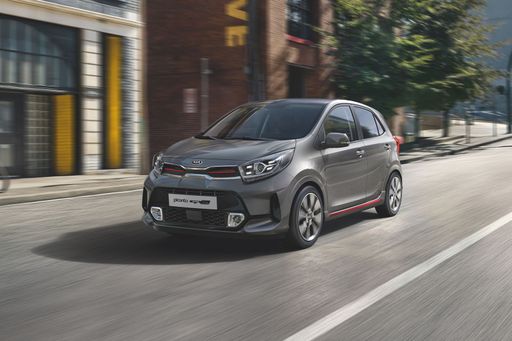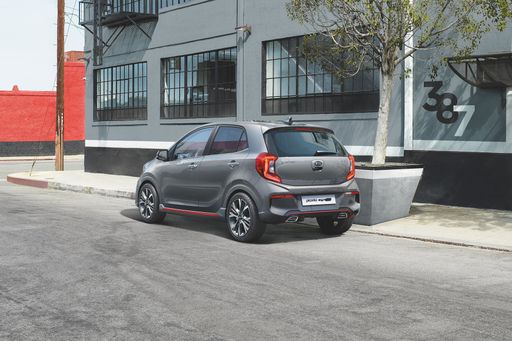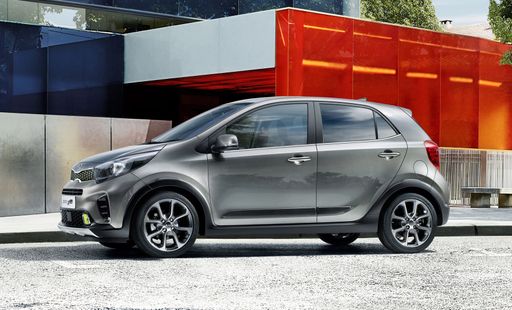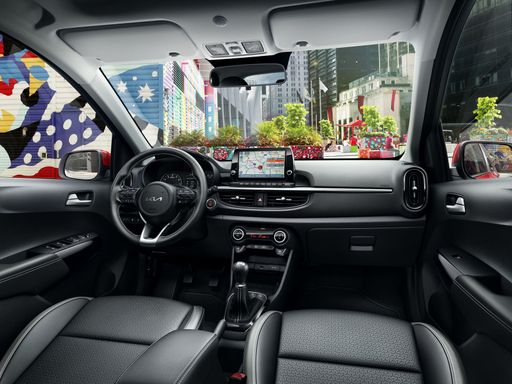Kia Picanto VS Toyota Yaris
In the competitive landscape of compact cars, the Kia Picanto and Toyota Yaris stand out for their unique offerings. The Picanto impresses with its agile handling and value-packed features, making it a popular choice for city drivers. Meanwhile, the Yaris showcases Toyota's renowned reliability and impressive fuel efficiency, appealing to those seeking a more versatile daily ride.
Kia Picanto
The Kia Picanto is a compact city car that combines practicality with a stylish design, making it an appealing option for urban drivers. Its cleverly designed interior maximises space, providing ample room for passengers and luggage despite its small footprint. With its efficient fuel consumption and easy manoeuvrability, the Picanto is well-suited for navigating through bustling city streets.
detailsToyota Yaris
The Toyota Yaris exudes a charming blend of practicality and style, making it an appealing choice for urban drivers. Its compact design allows for easy manoeuvrability in crowded city streets, while the interior offers a surprisingly spacious and comfortable environment. With a focus on fuel efficiency and reliability, the Yaris remains a popular option for those seeking a balance between performance and economy.
detailsWhen it comes to compact cars, the Kia Picanto and Toyota Yaris are two strong contenders. Each offers a unique blend of features, performance, and innovation tailored to modern drivers. In this article, we will delve into the technical aspects and innovative qualities of these two hatchbacks to help potential buyers make an informed choice.
The Body and Dimensions
Both vehicles feature a hatchback design, ideal for urban driving while providing versatility for everyday tasks. The Kia Picanto measures 3605 mm in length, 1595 mm in width, and 1485 mm in height, making it compact yet sufficiently spacious for a comfortable ride. In contrast, the Toyota Yaris is slightly larger, with dimensions of 3940 mm in length, 1745 mm in width, and 1500 mm in height. This extra size not only offers additional cabin space but also contributes to its road presence.
Powertrains and Performance
The Picanto is available with two petrol engine options: a 1.0L engine providing 63 HP and a 1.2L engine delivering 79 HP. It features a front-wheel-drive layout with a choice of either a manual or automatic transmission. Performance-wise, the Kia Picanto takes 15.6 seconds to reach 100 km/h with the lower-spec engine, while the 1.2L variant improves this to 13.1 seconds. Its top speed covers up to 159 km/h.
On the other hand, the Toyota Yaris shines with its hybrid options alongside traditional petrol engines. The hybrid version boasts a combined output of up to 116 HP from its 1.5L inline three-cylinder engine. The Yaris can sprint from 0-100 km/h in a brisk 9.7 seconds and reach a maximum speed of 175 km/h. Additionally, the Yaris offers an all-wheel-drive option, appealing to those in regions with diverse driving conditions.
Fuel Efficiency and Emissions
Fuel efficiency is a crucial aspect for many compact car buyers. The Picanto delivers commendable fuel consumption figures, ranging from 5.2 to 5.7 L/100 km, depending on the engine variant. The car's CO2 emissions range from 118 to 130 g/km, placing it in a CO2 efficiency class of D.
In contrast, the Toyota Yaris excels in this arena, especially in its full hybrid version, which can achieve fuel consumption as low as 3.8 L/100 km. CO2 emissions for the Yaris span from 87 g/km to 215 g/km, placing it in classes B to G, making it a more eco-friendly choice compared to the Picanto.
Interior and Comfort
Inside, the Kia Picanto provides seating for up to five occupants, featuring a well-organized dashboard and ample cargo space of 255 liters. While it may not boast premium materials, the Picanto is designed to be practical and user-friendly.
The Toyota Yaris accommodates five passengers as well but offers a more refined interior with better-quality materials and advanced technology. Its trunk space is slightly larger at 286 liters, making it more suitable for those needing extra luggage capacity. Additionally, the Yaris is equipped with a host of innovative features, including a comprehensive infotainment system and driver assistance technologies that enhance the driving experience.
Safety Features
Safety is paramount in today’s automotive landscape. The Kia Picanto is equipped with essential safety features, including multiple airbags, ABS, and stability control. However, it may lack some of the advanced assistance systems found in newer models.
In contrast, the Toyota Yaris boasts a more robust safety suite, incorporating Toyota’s Safety Sense technology, which includes adaptive cruise control, lane departure alert, and automatic emergency braking. This adds an extra layer of assurance for drivers and passengers alike.
Conclusion
Ultimately, the choice between the Kia Picanto and Toyota Yaris hinges on individual preferences and priorities. The Picanto serves as a compact, stylish urban vehicle with decent performance and efficiency, ideal for budget-minded consumers. Meanwhile, the Yaris elevates the driving experience with its hybrid options, superior fuel efficiency, innovative features, and robust safety systems. Both vehicles have their strengths, and a test drive will likely be the best way for buyers to determine which suits them better. Whether opting for the practicality of the Picanto or the innovation of the Yaris, both cars present strong options in the competitive hatchback market.
 @ press.kia.com
@ press.kia.com
 @ press.kia.com
@ press.kia.com
 @ press.kia.com
@ press.kia.com
 @ press.kia.com
@ press.kia.com
 @ Toyota
@ Toyota
 @ Toyota
@ Toyota

|

|
|
|
|
Costs and Consumption |
|
|---|---|
|
Price
about 15400 - 20300
$
|
Price
about 23600 - 46200
$
|
|
Consumption L/100km
5.2 - 5.7
L
|
Consumption L/100km
3.8 - 9.5
L
|
|
Consumption kWh/100km
-
|
Consumption kWh/100km
-
|
|
Electric Range
-
|
Electric Range
-
|
|
Battery Capacity
-
|
Battery Capacity
-
|
|
co2
118 - 130
g/km
|
co2
87 - 215
g/km
|
|
Fuel tank capacity
35
L
|
Fuel tank capacity
36 - 50
L
|
Dimensions and Body |
|
|
Body Type
Hatchback
|
Body Type
Hatchback
|
|
Seats
4 - 5
|
Seats
4 - 5
|
|
Doors
5
|
Doors
3 - 5
|
|
Curb weight
981 - 991
kg
|
Curb weight
1090 - 1356
kg
|
|
Trunk capacity
255
L
|
Trunk capacity
141 - 286
L
|
|
Length
3605
mm
|
Length
3940 - 3995
mm
|
|
Width
1595
mm
|
Width
1745 - 1805
mm
|
|
Height
1485
mm
|
Height
1455 - 1500
mm
|
|
Payload
339 - 425
kg
|
Payload
289 - 525
kg
|
Engine and Performance |
|
|
Engine Type
Petrol
|
Engine Type
Full Hybrid, Petrol
|
|
Transmission
Manuel, Automatic
|
Transmission
Automatic, Manuel
|
|
Transmission Detail
Manual Gearbox, Automated Manual
|
Transmission Detail
CVT, Manual Gearbox, Automatic Gearbox
|
|
Drive Type
Front-Wheel Drive
|
Drive Type
Front-Wheel Drive, All-Wheel Drive
|
|
Power HP
63 - 79
HP
|
Power HP
116 - 280
HP
|
|
Acceleration 0-100km/h
13.1 - 18.2
s
|
Acceleration 0-100km/h
5.5 - 9.7
s
|
|
Max Speed
145 - 159
km/h
|
Max Speed
175 - 230
km/h
|
|
Torque
95 - 115
Nm
|
Torque
390
Nm
|
|
Number of Cylinders
3 - 4
|
Number of Cylinders
3
|
|
Power kW
46 - 58
kW
|
Power kW
85 - 206
kW
|
|
Engine capacity
998 - 1197
cm3
|
Engine capacity
1490 - 1618
cm3
|
|
Top speed
145 - 159
km/h
|
Top speed
175 - 230
km/h
|
General |
|
|
Model Year
2024
|
Model Year
2024
|
|
CO2 Efficiency Class
D
|
CO2 Efficiency Class
B, G
|
|
Brand
Kia
|
Brand
Toyota
|
Kia Picanto
Compact Versatility: An Overview of the Kia Picanto
The Kia Picanto, with its chic and compact design, is a staple in urban landscapes across the globe. Offering a deft blend of efficiency, style, and functionality, the Picanto continues to evolve, catering to the demands of the modern driver. With the 2024 model year, Kia reaffirms its commitment to providing a small car that doesn't compromise on quality or innovation.
Engine Performance and Fuel Efficiency
The Kia Picanto comes with several engine options tailored to different needs, featuring both manual and automatic transmissions. The engines range from a 1.0-litre 3-cylinder to a 1.2-litre 4-cylinder, providing a power output between 63 and 79 PS. This allows the Picanto to offer a versatile driving experience that suits both urban and suburban environments. Fuel consumption is impressively low, with figures ranging between 5.2 to 5.7 litres per 100 km, emphasising the car's eco-friendly credentials.
Innovative Design and Technology
In terms of design, the Picanto boasts sleek lines and a modern silhouette. Although it's a five-door hatchback, the car maintains its compactness with dimensions of 3605 mm in length, 1595 mm in width, and 1485 mm in height. Inside, the Picanto surprises with its clever use of space, providing a comfortable cabin for up to five passengers and a boot capacity of 255 litres.
The Picanto is equipped with advanced technology aimed at enhancing the driver's experience and safety. Available equipment lines such as Edition 7, Vision, and GT Line offer varying levels of features, including improved infotainment systems and driver assistance technologies. These innovations make the Picanto not just economical, but also a smart choice for tech-savvy car buyers.
Safety Features and Driving Comfort
Safety has always been a priority for Kia, and the Picanto is no exception. The 2024 model comes equipped with a suite of safety features designed to protect its occupants. From enhanced structural integrity to available driver assist systems, Kia ensures that driving the Picanto is both secure and enjoyable. The Picanto manages speed efficiently, with a top range between 145 to 159 km/h, and provides a torque of 95 to 115 Nm, aiding in confident handling and acceleration.
Environmental and Economic Benefits
With CO2 emissions ranging from 118 to 130 g/km, the Picanto holds a D efficiency class. This is a significant factor for environmentally conscious drivers who still want to enjoy an efficient urban vehicle. The monthly cost of ownership is between €681 and €789, with a cost per kilometre of 27.2 to 31.6 cents, positioning the Picanto as an economically wise choice for budget-conscious drivers.
The Final Verdict
Overall, the Kia Picanto remains a formidable contender in the compact car segment, thanks to its combination of practicality, innovation, and efficiency. Whether navigating the bustling city streets or heading out on a weekend road trip, the Picanto proves to be a reliable and economical partner. With its modern styling and cutting-edge technology, it stands as a testament to Kia’s ability to adapt and thrive in the ever-evolving automotive landscape.
Toyota Yaris
Introducing the Next-Gen Toyota Yaris: A Blend of Innovation and Technology
The Toyota Yaris has long been lauded for its efficiency, reliability, and practicality. As we venture into the 2024 model year, Toyota has upped the ante with the latest versions of this popular hatchback, melding cutting-edge technology with eco-conscious design. Here’s an in-depth look at what makes the current Yaris line-up stand out from the crowd.
Efficient Powertrains: Hybrid and Beyond
Spearheading the technological innovation in the Yaris range is the introduction of various hybrid models. The Yaris offers a 1.5-litre full-hybrid engine, marrying a petrol engine with an electric motor to produce between 116 and 130 PS. This power blend is controlled via a sophisticated CVT-gearbox, optimizing both performance and fuel efficiency, with consumption figures ranging from an impressive 3.8 to 4.2 litres per 100 km.
For those seeking pure performance, the GR Yaris variants provide a turbocharged 1.6-litre engine capable of producing 280 PS. This power is delivered via a choice of manual or automatic transmission, giving drivers the tactile involvement or convenience they desire.
Design that Fulfils and Inspires
The Yaris hasn't forgotten its roots as a compact, city-friendly hatchback, measuring between 3,940 and 3,995 mm in length. With its bold front grille, sleek lines, and a choice of striking colours, it's a car that turns heads while remaining perfectly suited for urban environments.
The interior is equally impressive, designed with a focus on driver convenience and comfort. Depending on the variant, Yaris can offer generous cargo space of up to 286 litres, making it a perfect companion for everyday tasks or weekend escapes.
Technological Integration: The Smart Choice
Toyota's approach goes beyond just improving engine technology; the Yaris is packed with innovative features aimed at enhancing the driving experience. It boasts a suite of advanced safety systems such as lane departure alert, pre-collision system, and adaptive cruise control, ensuring peace of mind on the road.
The infotainment system in the Yaris is designed to keep you connected, offering seamless smartphone integration, a user-friendly interface, and an intuitive navigation system, ensuring that you're always informed and entertained.
The Cost of Innovation
Owning a Yaris is not just about impressive technology; it's also about making economic sense. With a price range between €25,500 and €49,990, and monthly costs spanning from €748 to €1,513, it offers a broad spectrum to suit different budget needs.
Concerned about emissions? You can rest easy knowing that the Yaris boasts a CO2 efficiency class ranging from B to G, thanks to its low emissions output of between 87 to 215 g/km.
Conclusion: The Toyota Yaris Drives the Future
The Toyota Yaris continues to be a strong contender in the compact car segment, pushing boundaries with its innovative full-hybrid systems and performance-oriented GR models. It's a remarkable blend of design, technology, and economy, ensuring it remains a top choice for drivers who demand more from their hatchbacks.
Whether you're seeking the efficiency of a hybrid or the thrill of the GR Yaris, there's a model tailored to your unique driving needs in Toyota's latest Yaris lineup.
